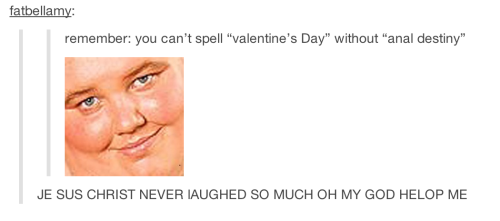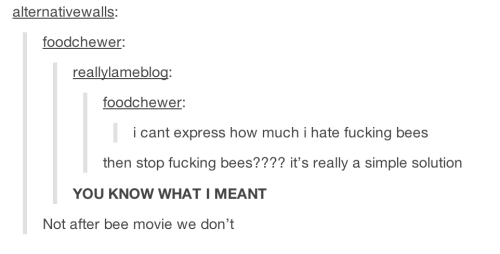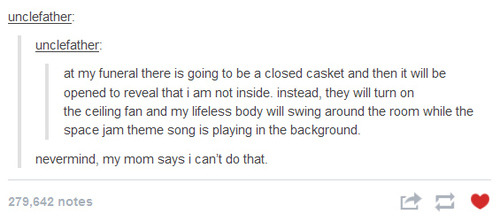Chuck Tingle
chuck tingle
just fucked an abstract concept
More Posts from Hello-apes-of-the-world and Others
















I was cleaning out my computer and I found a bunch of screenshots of text posts from 2013-2014. The golden age of tumblr.
I take no credit for these posts.
Yeah I feel Alexandria would probably win if only because she actually knows how to fight and has the whole Thinker thing going on
I enjoy The Boys but one major problem I have with it is that it’s so hard to compare strengths to other settings, like we never see Homelander challenged so we have no clue how’d he fair against others which I get is maybe sorta the point with it being like him as a medium fish on a small pond but it’s still annoying

So. Here we are then.
Stellar Firma means a lot to me and I'm honoured to have been able to experience it as it happened. I've met some of the most amazing people through it and been involved in projects I never would have imagined. I'm going to miss new weekly episodes but I'm so excited for bonus content and whatever the bros have planned.
May the board preserve and keep you, fellow citizen-employees.
i mean Assassin Creed syndicate kinda has this with your main base being a train that travels around the map and you can use to get around, the on problem is there’s also fast travel but if you’re going to a new area without fast travel points yet sometimes it’s best to just ride the train
I am BEGGING for an open-world game with a functioning train or tram.
Like, you actually have to wait for it in real-time, physically step on, then wait for your stop with the ability to actually explore it and chat with the other riders
No loading screens
And when you aren’t on it, you can look over and see it doing its route without you, picking up and dropping off patrons whether you’re there or not
please i need a video game that captures the joy of free public transit
woke up today and realized that tumblr entirely killed fuck ya life bing bong so here ya go again
crash
Daughter of fantasy villains decides to rebel against her parents by actually going through with her arranged marriage to a local golden retriever of a prince instead of running off with some local villain-to-be or conquering said golden retriever’s kingdom and ruling it solo like her parents expect her to. Plus, sue her, she’s into the clean-cut earnest look.
At the same time, local prince charming discovers that he’s actually very into the gothic fiance his parents have landed him with in order to try and establish peace with the local evil lair down the lane, he would never have guessed a spiderweb pattern could look so fetching on a ball gown…?
Meanwhile, two pairs of parents in a tizzy because they both expected their offspring to whole-heartedly reject this union and give them an excuse to conquer their goody-two-shoes/evil neighbours, they’re not supposed to actually like each other-!
are either of these stories good? cause they sound really interesting
On the one hand, it's true that the way Dungeons & Dragons defines terms like "sorcerer" and "warlock" and "wizard" is really only relevant to Dungeons & Dragons and its associated media – indeed, how these terms are used isn't even consistent between editions of D&D! – and trying to apply them in other contexts is rarely productive.
On the other hand, it's not true that these sorts of fine-grained taxonomies of types of magic are strictly a D&D-ism and never occur elsewhere. That folks make this argument is typically a symptom of being unfamiliar with Dungeons & Dragons' source material. D&D's main inspirations are American literary sword and sorcery fantasy spanning roughly the 1930s through the early 1980s, and fine-grained taxonomies of magic users absolutely do appear in these sources; they just aren't anything like as consistent as the folks who try to cram everything into the sorcerer/warlock/wizard model would prefer.
For example, in Lydon Hardy's "Five Magics" series, the five types of magical practitioners are:
Alchemists: Drawing forth the hidden virtues of common materials to craft magic potions; limited by the fact that the outcomes of their formulas are partially random.
Magicians: Crafting enchanted items through complex manufacturing procedures; limited by the fact that each step in the procedure must be performed perfectly with no margin for error.
Sorcerers: Speaking verbal formulas to basically hack other people's minds, permitting illusion-craft and mind control; limited by the fact that the exercise of their art eventually kills them.
Thaumaturges: Shaping matter by manipulating miniature models; limited by the need to draw on outside sources like fires or flywheels to make up the resulting kinetic energy deficit.
Wizards: Summoning and binding demons from other dimensions; limited by the fact that the binding ritual exposes them to mental domination by the summoned demon if their will is weak.
"Warlock", meanwhile, isn't a type of practitioner, but does appear as pejorative term for a wizard who's lost a contest of wills with one of their own summoned demons.
Conversely, Lawrence Watt-Evans' "Legends of Ethshar" series includes such types of magic-users as:
Sorcerers: Channelling power through metal talismans to produce fixed effects; in the time of the novels, talisman-craft is largely a lost art, and most sorcerers use found or inherited talismans.
Theurges: Summoning gods; the setting's gods have no interest in human worship, but are bound not to interfere in the mortal world unless summoned, and are thus amenable to cutting deals.
Warlocks: Wielding X-Men style psychokinesis by virtue of their attunement to the telepathic whispers emanating from the wreckage of a crashed alien starship. (They're the edgy ones!)
Witches: Producing improvisational effects mostly related to healing, telepathy, precognition, and minor telekinesis by drawing on their own internal energy.
Wizards: Drawing down the infinite power of Chaos and shaping it with complex rituals. Basically D&D wizards, albeit with a much greater propensity for exploding.
You'll note that both taxonomies include something called a "sorcerer", something called a "warlock", and something called a "wizard", but what those terms mean in their respective contexts agrees neither with the Dungeons & Dragons definitions, nor with each other.
(Admittedly, these examples are from the 1980s, and are thus not free of D&D's influence; I picked them because they both happened to use all three of the terms in question in ways that are at odds with how D&D uses them. You can find similar taxonomies of magic use in earlier works, but I would have had to use many more examples to offer multiple competing definitions of each of "sorcerer", "warlock" and "wizard", and this post is already long enough!)
So basically what I'm saying is giving people a hard time about using these terms "wrong" – particularly if your objection is that they're not using them in a way that's congruent with however D&D's flavour of the week uses them – makes you a dick, but simply having this sort of taxonomy has a rich history within the genre. Wizard phylogeny is a time-honoured tradition!
-
 thanatos413notdeath reblogged this · 1 year ago
thanatos413notdeath reblogged this · 1 year ago -
 thanatos413notdeath liked this · 1 year ago
thanatos413notdeath liked this · 1 year ago -
 enkindlephoenix liked this · 1 year ago
enkindlephoenix liked this · 1 year ago -
 abitrarily reblogged this · 1 year ago
abitrarily reblogged this · 1 year ago -
 ciabatta-babe liked this · 1 year ago
ciabatta-babe liked this · 1 year ago -
 adipemdragon liked this · 1 year ago
adipemdragon liked this · 1 year ago -
 osteobiflex reblogged this · 1 year ago
osteobiflex reblogged this · 1 year ago -
 osteobiflex liked this · 1 year ago
osteobiflex liked this · 1 year ago -
 mr-mustache-penis liked this · 1 year ago
mr-mustache-penis liked this · 1 year ago -
 haplessentity reblogged this · 1 year ago
haplessentity reblogged this · 1 year ago -
 microbialdoormat liked this · 1 year ago
microbialdoormat liked this · 1 year ago -
 silicide reblogged this · 1 year ago
silicide reblogged this · 1 year ago -
 merrybinature reblogged this · 1 year ago
merrybinature reblogged this · 1 year ago -
 kingshrmp reblogged this · 1 year ago
kingshrmp reblogged this · 1 year ago -
 fourteen-of-spades reblogged this · 1 year ago
fourteen-of-spades reblogged this · 1 year ago -
 littleheathen reblogged this · 1 year ago
littleheathen reblogged this · 1 year ago -
 definitelynotafox reblogged this · 1 year ago
definitelynotafox reblogged this · 1 year ago -
 definitelynotafox reblogged this · 1 year ago
definitelynotafox reblogged this · 1 year ago -
 puppitykitty reblogged this · 1 year ago
puppitykitty reblogged this · 1 year ago -
 inactivemainhi liked this · 1 year ago
inactivemainhi liked this · 1 year ago -
 stout-stoat reblogged this · 1 year ago
stout-stoat reblogged this · 1 year ago -
 thejdogga liked this · 1 year ago
thejdogga liked this · 1 year ago -
 dreamyraincloud reblogged this · 1 year ago
dreamyraincloud reblogged this · 1 year ago -
 mtheweeb liked this · 1 year ago
mtheweeb liked this · 1 year ago -
 aces-and-kings liked this · 1 year ago
aces-and-kings liked this · 1 year ago -
 starforger liked this · 1 year ago
starforger liked this · 1 year ago -
 luck-and-larceny liked this · 1 year ago
luck-and-larceny liked this · 1 year ago -
 gatheredfates reblogged this · 1 year ago
gatheredfates reblogged this · 1 year ago -
 cor-regnum reblogged this · 1 year ago
cor-regnum reblogged this · 1 year ago -
 loacim liked this · 1 year ago
loacim liked this · 1 year ago -
 macoroniinapot reblogged this · 1 year ago
macoroniinapot reblogged this · 1 year ago -
 enderagenda reblogged this · 1 year ago
enderagenda reblogged this · 1 year ago -
 enderagenda liked this · 1 year ago
enderagenda liked this · 1 year ago -
 fallout-new-vegas-official reblogged this · 1 year ago
fallout-new-vegas-official reblogged this · 1 year ago -
 hopskipandarump reblogged this · 1 year ago
hopskipandarump reblogged this · 1 year ago -
 rattuspatattus2 reblogged this · 1 year ago
rattuspatattus2 reblogged this · 1 year ago -
 rattuspatattus2 liked this · 1 year ago
rattuspatattus2 liked this · 1 year ago -
 levan-shprota reblogged this · 1 year ago
levan-shprota reblogged this · 1 year ago -
 levan-shprota liked this · 1 year ago
levan-shprota liked this · 1 year ago -
 wolfedfiend liked this · 1 year ago
wolfedfiend liked this · 1 year ago



